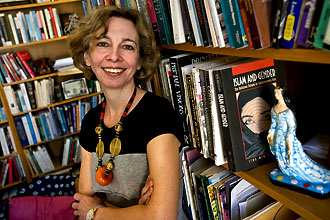Banning Barbie
In an attempt to deter the influence of Western culture in their country, Iranian government officials have banned the import of Barbie dolls and several other American-branded toys. Adeline Masquelier, professor of anthropology at Tulane, understands the government's reasoning behind the ban, but says it may result in unintended consequences.

Adeline Masquelier, professor of anthropology, says there is a subversive element in Iran that is drawn to the very things that are banned. (Photo by Paula Burch Celentano)
“In Iran, there is clearly a subversive element who wants to get these things because they are banned,” says Masquelier, referring to the pervasive black market demand for the dolls. “The Iranian government sees the doll as a Trojan Horse that brings dangerous American values into the country. But what seems to be happening is that religion is being pushed so heavily by the government that it is making the younger Iranians, born after the revolution of 1979, irreligious.”
Masquelier says the “over-sexed image resulting from Barbie's exposed hair, bright lipstick and non-traditional career roles played a significant role in the government's decision.” Barbie's rack of clothing, which includes mini skirts and midriff-baring tops, also is an affront to officials who enforce the wearing of traditional garments such as the hijab or chador by Muslim women.
“In places like Iran where these dress codes are enforced, people are living two lives the life the government wants them to live and a life that includes other things like watching banned shows via satellite,” Masquelier says. “There are actually more bloggers per capita in Iran because it's a way to escape reading only what the government releases in its news.”
Gender politics and religious issues also were themes in Masquelier's critically acclaimed book, Women and Islamic Revival in a West African Town, which provides a candid look at Muslim women living in Africa today. In addition to teaching courses in anthropology, she also is director of the religious studies program at Tulane.
